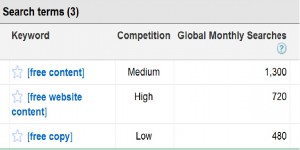During some routine keyword research I stumbled across some keywords related to “Free Website content”. It looked something like this:
Ok so in terms of relative search volume that’s not too bad.
But it does say there’s still a good chunk of people out there who haven’t gotten the memo about content in a post-Panda world. So for anyone who is still missing the writing on the wall when it comes to writing on the web, here’s a Public Service Announcement:
You don’t really want free website content.
I know generating content is a challenge, and the bigger your site is the more of a problem content creation becomes. But free web content is rarely the best answer to your problem.
Odds are you know all of the basic good reasons to have content. It helps with search engines, it provides education, and more indexed pages provide more entry ways for visitors. It’s just one of those basic website necessities. Like clothes are necessities to leave the house without getting arrested.
But who goes anywhere wearing a muslin sack that’s just enough to keep it legal?
The point is, doing the bare minimum doesn’t represent you well. It doesn’t demonstrate your authority, it doesn’t provide value and it’s not going to help your rankings either.
The Point of Great Content
Creating the kind of content that people are actually going to want to consume is the challenge for every website. Whether its words, images or video, the form you choose isn’t nearly as important as the function. And the function is to make your website attention worthy.
Getting attention and keeping it is one of your content’s most important jobs. It should also establish your expertise, elevate your brand and distinguish you within your niche.
Well, it’s pretty unlikely free content is gonna pull that off.
Total Web Duplication
The number one reason I’d advise against free content is the very simple issue of duplication. Quite simply, nothing stays unique online for long. Thanks to scrapers and reproductions, once something goes live it inevitably shows up, verbatim, someplace else. It’s a fact of the web. So it’s not about being the only one to publish something, it’s about being the first and establishing ownership. You can’t do that with free web content that you find on the web. So if you can’t be the originator of a piece of content, then why have it? Leave the sloppy seconds for someone else.
No one gives the best stuff away for free
Against general wisdom, I’ve found there is such a thing a free lunch. It’s just not usually very good. Think about everything you’ve ever gotten for free, it always has one of 2 conditions, it comes with an agenda (i.e promotional products, free samples) or it’s inferior quality (free day old muffins!).
Now, this isn’t a knock on the writers that work for free content sites…well not entirely anyway. Some of them are legitimately decent. But if you go to a free content site looking for something that’s going to move you or add significant value to your website you’re probably going to be disappointed. Sure, you may find a rare gem of inspiration. But put a line or two of it in quotations into Google and find out exactly how “rare” your gem really is. Chances are if you thought it was really good, so did 100 other people before you.
Brand Ambassadors or Brand Embarrassers?
The content you publish speaks directly to your credibility. So ideally you would have the most qualified person possible speaking for your brand. Of course, in the real world, that person probably already has enough balls in their court already without adding content creation.
But when you can’t write it yourself, you should at least have a hand in the creation or have some level of interaction with the people who will literally be speaking for your business. You wouldn’t send an intern to a board meeting, so why would you trust a stranger to represent your brand to the web public? When you can’t do the creating you should at least collaborate with those who will.
Suck It Up So Your Site Won’t Suck
Populating a website with content can feel like a monumental pain. It’s hard to find time to write articles, or make videos when you’re busy running a business. That makes it incredibly tempting to run with anything that saves time and money. As far as temptations go, free content falls somewhere between black tar heroin and a glazed donut:
It’s not gonna kill you, but it’s not quite a harmless guilty pleasure either.
Free website content tends to be highly duplicated, incredibly basic, and devoid of the kind of authoritative voice you want associated with your brand. It may be inconvenient, but it’s time to bypass the free content and figure how much it’s worth investing in your own public image. Remember, the good stuff doesn’t come free, the great stuff is expensive and the best stuff probably comes from you.





10 Responses
Good points to make. It’s especially good for the newbies out there.
Thanks Marnette! The virtues of great content can’t be over-stated
Hey I write my best posts as guest posts for blogs so “No one gives the best stuff away for free” could not be true :p
Hahah touche Sachin… however, I might counter that in return for a guest post you get the promotion and the visibility offered by the host blog, and of course a back link…so it’s not REALLY free 😉
I think the duplicate content portion is *huge* especially in light of the Panda update. Simply put: having tons of pages that include external duplicate content – such as free website content – exposes you to risk in a way that did not exist in the past. Not only will visitors pogostick (click back to google) but google will know that the content is dup could cost you some rankings. Yeah Jen, agreed, totally sucks for your brand and it can hurt you in search too….
I wonder how that adorable, fluffy, little Googlebot feels about sites that are constructed around the re-use (duplication) of their in-house authored content? I’ll use a fictitious blog about ice cream as an example. The author writes a post about a magnificent ice cream cone she had: vanilla dipped in chocolate. (Yum!) She tags the post with ‘chocolate,’ ‘vanilla,’ and ‘cone.’ Now, this post is going to be published on the index page of the blog, it’s own post page, as well as the three distinct tag pages, either in full form or an excerpt. Why doesn’t our friend Googley Woogley view the five instances of this single post as dup content? Obviously, each page the post appears on will be constructed differently and have other content, links, ect. present. But what if this post is the only one tagged as ‘chocolate?’ The chocolate tag page and the post’s own page might be very similar indeed.
That’s a great point Mark! Blogs can be especially difficult to deal with in preventing dup content. Perhaps the Rel= canonical tag can be useful in, at the very least, letting Google know which URL is the primary one.
This is really interesting, thank you. I recently started a small site about running and I’m trying to get as much good content up there as I can. I have hundreds of ideas and I want it in a friendly style. The problem is, I already work 50 hours a week and I’m a long distance runner. This doesn’t leave much time for my site – but I love making it, so I threw up a free article which I don’t even like and now I’m worried that actually, I’ve weakened my site rather than improved it. I even had to go through the article and change several instances of “your” to “you’re” etc.
This is the article:
http://takeitinyourstride.co.uk/your-first-training-plan-for-running/
Any help or thoughts are much appreciated as I’m really new to this sort of thing…please don’t slate it too much though.
Good advise! I always use my original material in my articles but have been tempted to use others, it is especially difficult if you have no expertise or niche like myself. I have no PR but what the hell, it’s not mandatory that you make money, i just enjoy making my site. jimbase.com
Pretty true, but I’ve seen some great sites based on free content that were made by mixing content. For instance, Fireburst Finance is charts, calculators, financial news and search. It’s pretty good. But of course it isn’t near as good as unique content finance sites such as Yahoo! finance.
Comments are closed.